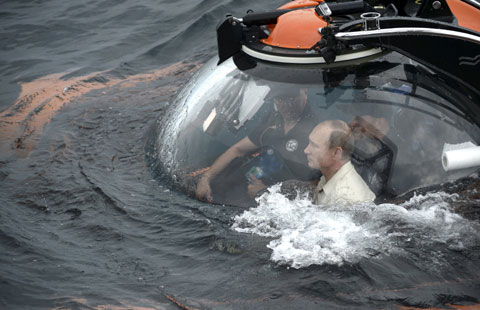The Arctic test and how Obama failed in it
Updated: 2015-08-24 08:26
By Op Rana(China Daily)
|
||||||||
 |
|
Democratic presidential candidate Hillary Clinton speaks during a town hall meeting in Las Vegas, Nevada August 18, 2015. [Photo/Agencies] |
Two steps forward one step back, that's what US President Barack Obama is likely to say if asked how he could promise Washington's grandest plan to fight climate change - the "historic" Climate Action Plan announced on Aug 3 - and give the green light to Shell for oil exploratory drilling in the Arctic Ocean two weeks later.
But Obama's move is more like "one step forward, two (actually dozens of) steps back" in the fight against climate change.
More than a century ago, Lenin used the term "one step forward, two steps back" to defend his role at the Second Congress of the RSDLP (Russian Social Democratic Labour Party). In fact, he released a pamphlet titled One Step Forward, Two Steps Back - The Crisis in Our Party that examined the developments leading to the split of the RSDLP into Bolsheviks and Mensheviks. Although the revolution launched in Tsarist Russia the next year failed, the ultimate triumph of the Bolsheviks in 1917 lent credence to Lenin's "one step forward, two steps back" theory.
No such fate awaits Obama. His "historic" plan, focused on reducing carbon dioxide emissions from American power plants by 32 percent by 2030, is aimed at scoring brownie points at the UN climate change conference in Paris in December. But the contradiction between Obama's Climate Action Plan and green light to Shell shows where the US administration's heart lies. There is no way the US administration can reduce CO2 emissions while encouraging drilling in the Arctic (because of the climate change-induced loss of sea ice) as well as along the Atlantic coast.
Sadly, the debate over Arctic drilling seems to be centered on the high risks involved. For instance, many of those against drilling in the Arctic Ocean have cited a study conducted by the US Department of Interior, which shows there is "a 75 percent chance of a major oil spill in the future" and wondered how the same department could give permission to Shell to drill in the Arctic.
The risk factor incidentally is incidental. The opposition to drilling in the Arctic should have less to do with risks and everything to do with environmental protection, because accident or no accident, drilling in the Arctic will be detrimental to the environment, because like parts of planet Earth it is fragile.
The fact is that, we can see some phenomenon more clearly because we want to do so and turn a blind eye to the less evident but equally obvious ones. And that is exactly why people who see Democratic presidential candidate Hillary Clinton as the new icon of the fight against climate change should be warned. Clinton, reports say, has opposed Obama's move and tweeted: "The Arctic is a unique treasure. Given what we know, it's not worth the risk of drilling." She seems bothered about the risk, the risk of the possible loss of money, not the damage to the environment per se. Obama throughout his presidency has put up a similar fa?ade, the fa?ade of protecting the environment and done exactly what big business has demanded. For all we know, the Earth can turn into hell as long as it continues to churn out more cash for the powers that be.
From sublime to the ridiculous is only one step, and that is exactly what world leaders are prone to taking. It's the money, stupid, to misquote former US president Bill Clinton.
Perhaps David Balton, deputy assistant secretary for oceans and fisheries in the State Department, has unwittingly said the obvious: "My own hope is that when our children's time come, we'll be past this debate (whether or not to drill in the Arctic) and the world will have moved on to other types of energy that do not affect climate change."
The only problem is that the world will not be what we want it to be because big oil will not allow other types of energy to be developed, and there won't be space to take any step forward.
The author is a senior editor with China Daily. oprana@hotmail.com
- Tsipras formally resigns, requesting snap general elections
- China-Russia drill not targeting 3rd party
- UK, France boost security
- China demands Japan face history after Abe's wife visits Yasukuni Shrine
- DPRK deploys more fire units to frontlines with ROK
- DPRK, ROK trade artillery, rocket fire at border

 Giant panda Bao Bao celebrates two-year birthday
Giant panda Bao Bao celebrates two-year birthday
 Across America over the week (Aug 14 - Aug 20)
Across America over the week (Aug 14 - Aug 20)
 Stars in their eyes: leaders in love
Stars in their eyes: leaders in love
 A survival guide for singles on Chinese Valentine’s Day
A survival guide for singles on Chinese Valentine’s Day
 Beijing police publishes cartoon images of residents who tip off police
Beijing police publishes cartoon images of residents who tip off police
 Rare brown panda grows up in NW China
Rare brown panda grows up in NW China
 Putin rides to bottom of Black Sea
Putin rides to bottom of Black Sea
 The changing looks of Beijing before V Day parade
The changing looks of Beijing before V Day parade
Most Viewed
Editor's Picks

|

|

|

|

|

|
Today's Top News
China advocates practical cooperation between LatAm, East Asia
Giant panda gives birth at Washington's National Zoo
Emissions data won't change China policy
Preparations shutter Forbidden City, other major tourist spots
President Xi Jinping calls for crews not to ease up
Chemical plants to be relocated in blast zone
Asian sprinters on track to make some big strides
Jon Bon Jovi sings in Mandarin for Chinese Valentine's Day
US Weekly

|

|






